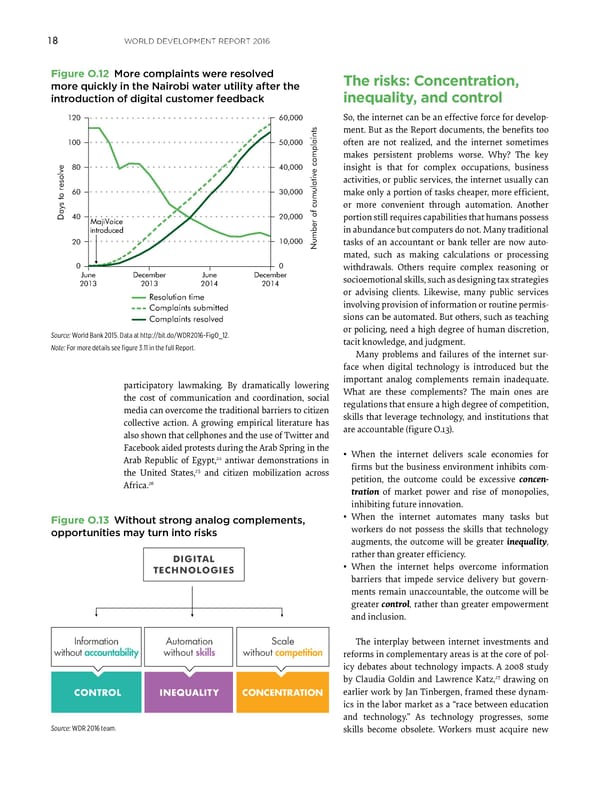WORLD DEVELOPMENT REPORT 2016 18 Figure O.12 More complaints were resolved The risks: Concentration, more quickly in the Nairobi water utility after the introduction of digital customer feedback inequality, and control 120 60,000 So, the internet can be an effective force for develop- ment. But as the Report documents, the benefits too 100 50,000 often are not realized, and the internet sometimes makes persistent problems worse. Why? The key 80 40,000 insight is that for complex occupations, business activities, or public services, the internet usually can 60 30,000 make only a portion of tasks cheaper, more efficient, or more convenient through automation. Another Days to resolve40MajiVoice 20,000 portion still requires capabilities that humans possess introduced in abundance but computers do not. Many traditional 20 10,000 Number of cumulative complaintstasks of an accountant or bank teller are now auto- mated, such as making calculations or processing 0 0 withdrawals. Others require complex reasoning or June December June December socioemotional skills, such as designing tax strategies 2013 2013 2014 2014 or advising clients. Likewise, many public services Resolution time involving provision of information or routine permis- Complaints submitted Complaints resolved sions can be automated. But others, such as teaching Source: World Bank 2015. Data at http://bit.do/WDR2016-FigO_12. or policing, need a high degree of human discretion, Note: For more details see figure 3.11 in the full Report. tacit knowledge, and judgment. Many problems and failures of the internet sur- face when digital technology is introduced but the participatory lawmaking. By dramatically lowering important analog complements remain inadequate. the cost of communication and coordination, social What are these complements? The main ones are media can overcome the traditional barriers to citizen regulations that ensure a high degree of competition, collective action. A growing empirical literature has skills that leverage technology, and institutions that also shown that cellphones and the use of Twitter and are accountable (figure O.13). Facebook aided protests during the Arab Spring in the • When the internet delivers scale economies for 24 Arab Republic of Egypt, antiwar demonstrations in firms but the business environment inhibits com- the United States,25 and citizen mobilization across petition, the outcome could be excessive concen- Africa.26 tration of market power and rise of monopolies, inhibiting future innovation. Figure O.13 Without strong analog complements, • When the internet automates many tasks but opportunities may turn into risks workers do not possess the skills that technology augments, the outcome will be greater inequality, DIGITAL rather than greater efficiency. TECHNOLOGIES • When the internet helps overcome information barriers that impede service delivery but govern- ments remain unaccountable, the outcome will be greater control, rather than greater empowerment and inclusion. Information Automation Scale The interplay between internet investments and without accountability without skills without competition reforms in complementary areas is at the core of pol- icy debates about technology impacts. A 2008 study by Claudia Goldin and Lawrence Katz,27 drawing on CONTROL INEQUALITY CONCENTRATION earlier work by Jan Tinbergen, framed these dynam- ics in the labor market as a “race between education and technology.” As technology progresses, some Source: WDR 2016 team. skills become obsolete. Workers must acquire new
 World Development Report 2016 Page 31 Page 33
World Development Report 2016 Page 31 Page 33